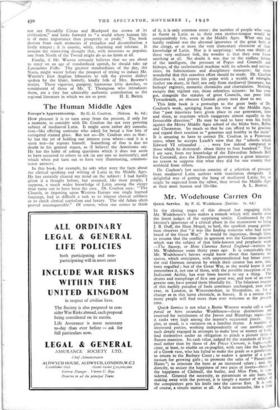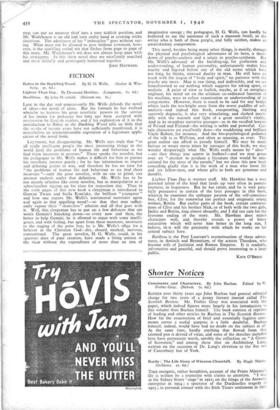Mr. Wodehouse Carries On
Quick Service. By P. G. Wodehouse. (Jenkins. 7s. 6d.)
IN the closing stages of this absurd but engaging frolic Mr. Wodehouse's hero makes a remark which will startle even the finest judges of the surprising simile. Confronted by the heroine's ignorance of a critical phase in the manoeuvre to bring J. B. Duff, the Ham Mogul, to heel, the sparkish young gentle- man observes that " it was like finding someone who had never heard of the Great War." It would be ingenious, though false, to assume that the conflict in question was the German invasion which was the subject of that little-known and prophetic work —The Swoop, or How Clarence Saved England—written by Mr. Wodehouse some thirty years ago. It is conceivable that Mr. Wodehouse's heroes would know about that fantastic in- vasion, which anticipates, with unpremeditated but bitter irony, the real German invasion by which their creator has now, alas, been engulfed ; but of the Great War, as the world knew it and remembers it, not one of them, with the possible exception of the Indiscreet Archie, has ever been known to say a thing. The drums and tramplings of first one great war, and now of an even greater one, have passed them blissfully by. The hilarious routine of this earthly paradise of fools continues unchanged, year after year, in London, in Worcestershire, in Shropshire, or, for a change as in this latest chronicle, in Sussex. It is a retreat that many people will find more than ever welcome at the present time.
Quick Service is not what a Bertie Wooster would call a nulli pareil or hors secundus Wodehouse—these distinctions are reserved for instalments of the Jeeves and Blandings sagas—but it ranks very high among the master's occasional pieces. The plot, as usual, is a variation on a familiar theme. A number of interested parties, working independently of one another, and each deeply engaged in attempts to make love or money or both, find themselves under an obligation to pinch a picture from a Sussex mansion. Its cash value, judged by the standards of black- mail rather than by those of Art Prices Current, is high—suffi- cient, at least, to enable an ex-pugilist, with ears like the handles of a Greek vase, who has failed to make the grade as a gentleman, to return to the Barbary Coast ; to endow a quarter of a gym- nasium for growing girls ; to promote the sales of " Paramonn t Hams "; to reinstate the hero at an increased salary ; and, In- directly, to secure the happiness of two pairs of lovers--three, tf the happiness of Chibnall, the butler, and Miss Pym, is con- sidered. Granted the necessity, as paramount as any ham, for making away with the portrait, it is simply a matter of which of the conspirators gets his knife into the canvas first. It is not, of course, a simple matter at all. A false moustache, like a false
step, can put an amateur thief into a very ticklish position, and Mr. Wodehouse is an old and very crafty hand at creating sticky situations. The adroitness of his " imbroglios " goes without say- ing. What must not he allowed to pass without comment, how- ever, is the sparkling verbal wit that flashes from page to page of this story. Mr. Wodehouse's wit does not always keep pace with his stratagems. In this short novel they are excellently matched and most skilfully and grotesquely harnessed together.
JOHN HAYWARD.







































 Previous page
Previous page